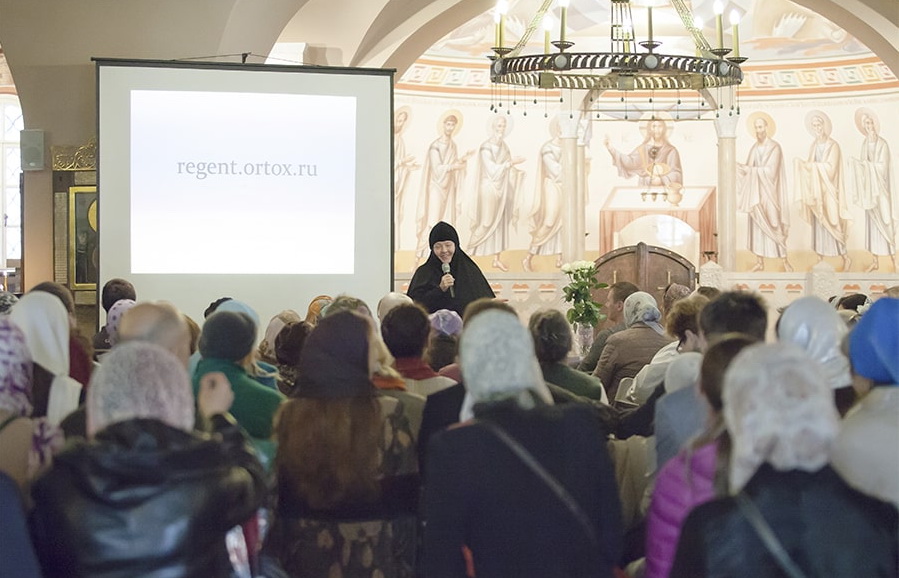 Nun Juliania (Denisova)
Nun Juliania (Denisova)
When asked about how music is born, nun Juliania answers quite simply. She taught children for 30 years, explained to them what a melody consists of, how to break it down into components and put it back together, “just like a construction kit”. But only when talent is applied music becomes an expression of something “transcendent, unearthly” and communicates unity, so that every listener thinks this particular composition is about him.
Simply creating a melody is easy for nun Juliania due to her higher musical education and a wealth of experience. She doesn’t even consider such unfinished compositions worth attention. Only the ones constantly recurring, the ones which she loves dearly deserve to be embodied in a fully-finished structure of a chant.
 Nun Juliania is not a favourer of author’s music in the Church. She thinks that a church needs a beauty of another kind – ascetic, modest, free of emotional outbursts and harmonic curves. She believes everything has been written before us. Not even written – given by God. And these God-given melodies comprise the body of the Znamenny or Byzantine chants.
Nun Juliania is not a favourer of author’s music in the Church. She thinks that a church needs a beauty of another kind – ascetic, modest, free of emotional outbursts and harmonic curves. She believes everything has been written before us. Not even written – given by God. And these God-given melodies comprise the body of the Znamenny or Byzantine chants.
Being a precentor, a conductor of a church choir, nun Juliania speaks about its members with a warm heart. She considers unity to be the most important thing in the choir. Special attention is given to love and friendship among the choir members, and this is very dear to her. A lot of people has been part of the choir through the years, but those who remained till today she calls “a wonderful fellowship and God’s mercy”.
In her life before the Convent nun Juliania had everything: fame, wealth, children. But she heard a calling. It was a need to overcome herself. Such a time when she felt she could not live like that any more. And nun Juliania (Irina Denisova back then) went into the Convent to start a new spiritual life. She became a nun to face her sins, not knowing how to fight them yet, to learn how to uncover and condemn them inside her soul and cope with them with God’s help.
The monastic community of the convent is made up of 130 nuns. Nun Juliania sees them all as a family and considers the point of a convent life to be not only about asceticism and obedience but also about blending into this family.
Once a week common meetings are held. Nun Juliania thinks them to be the core of the convent. There’s barely such practice in any other Russian Orthodox monastic communities. There are two types of meetings: for lay sisters and for monastic sisters. The first gather around 300 sisters of mercy (“white sisters”) and 125 nuns (“black sisters”). During the meetings for monastic sisters only the nuns, the Abbess and the Spiritual Father of the convent are present. Whoever wants to discuss their inner problems gets such an opportunity at these meetings.
It is important for nun Juliania to speak openly at the meetings, not for the sake of rebuking another sister, but to determine her own fault in this or that situation. Not justify herself, not consider herself to be right, but to see everything in the light of Truth, which is so important in a convent.
St Elisabeth Convent is open to the public. Sisters can be visited by their relatives, parishioners of the convent. Nun Juliania thinks that normal Orthodox Christianity should have everything: family ties, openness, common meetings.
From the times she lived a secular life sister Juliania has three children and grandchildren. A son and a daughter sing in the convent’s choir and another son lives in the USA. They haven’t seen each other for three years. The son and his family keep close to the church even in Texas: he is a church reader, a member of the choir and part of the parish council, and his kids go to a Sunday school. Nun Juliania doesn’t feel the weakening of the bond with her children, believing that God has arranged everything wisely.
It is important to her as a mother and a nun that her children stay with God. She didn’t force any of them into the church, but gave them freedom, although it wasn’t easy for her as a mother at all. She showed them the way, and they have found faith in Christ on their own. Now they are wise, mature people, firmly established in the Orthodox Christian faith.
Nun Juliania manifests her motherly love not in sentimentality or meddling in her children’s lives, but in gaining their trust and fully accepting them, becoming their friend. “Love is when I always keep someone in my prayers.”
 Nun Juliania (Denisova)
Nun Juliania (Denisova)
Nun Juliania manifests her motherly love not in sentimentality or meddling in her children’s lives, but in gaining their trust and fully accepting them, becoming their friend. “Love is when I always keep someone in my prayers.”
Answering the question “Are you happy?” nun Juliania says that in the environment she lives and serves in the term “happiness” is irrelevant. There’s no such word in the Gospel and she doesn’t want to elaborate on this. Her relatives are safe and sound, people around understand her, she has an opportunity to create. This is happiness but not the plenitude of life. As nun Juliania says for herself, “This word is not enough in order to express the essence of my life.”